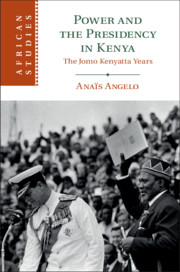Book contents
- Power and the Presidency in Kenya
- African Studies Series
- Power and the Presidency in Kenya
- Copyright page
- Dedication
- Contents
- Acknowledgments
- Introduction
- 1 Kenyatta’s Stateless Political Imagination
- 2 From Prison to Party Leader, an Ambiguous Ascension (1958–1961)
- 3 Kenyatta, Land, and Decolonization (1961–1963)
- 4 Independence and the Making of a President (1963–1964)
- 5 Kenyatta, Meru Politics, and the Last Mau Mau (1961/3–1965)
- 6 Taming Oppositions: Kenyatta’s “Secluded” Politics (1964–1966)
- 7 Ruling over a Divided Political Family (1965–1969)
- 8 “Kenyatta Simply Will Not Contemplate His Own Death” (1970–1978)
- Conclusion
- Sources
- Bibliography
- Index
- African Studies Series
7 - Ruling over a Divided Political Family (1965–1969)
Published online by Cambridge University Press: 11 October 2019
- Power and the Presidency in Kenya
- African Studies Series
- Power and the Presidency in Kenya
- Copyright page
- Dedication
- Contents
- Acknowledgments
- Introduction
- 1 Kenyatta’s Stateless Political Imagination
- 2 From Prison to Party Leader, an Ambiguous Ascension (1958–1961)
- 3 Kenyatta, Land, and Decolonization (1961–1963)
- 4 Independence and the Making of a President (1963–1964)
- 5 Kenyatta, Meru Politics, and the Last Mau Mau (1961/3–1965)
- 6 Taming Oppositions: Kenyatta’s “Secluded” Politics (1964–1966)
- 7 Ruling over a Divided Political Family (1965–1969)
- 8 “Kenyatta Simply Will Not Contemplate His Own Death” (1970–1978)
- Conclusion
- Sources
- Bibliography
- Index
- African Studies Series
Summary
Chapter 7 explores how Kenyatta’s presidential authority evolved after the stabilisation of his regime. It first analyses how the politicization of the land market was an exercise of regime-building, establishing a network of shared dependencies, allocating land to local political “big-men”. This is followed by an examination of the early years of the politics of succession. By 1965, the fragile alliance of convenience set up between Kenyatta and his main contenders, Oginga Odinga and Tom Mboya, was beginning to crack, while Kenyatta’s old age and fragile health revived the question of presidential succession. The government’s merciless repression against any form of opposition and dissidence culminated with the murder of Tom Mboya in 1969. Throughout these years, Kenyatta used the same strategy that had salvaged him during the “Release Kenyatta” campaign: preserving the status quo. He was left with the role of ruling over a divided political family, using his unrivalled access to state resources.
- Type
- Chapter
- Information
- Power and the Presidency in KenyaThe Jomo Kenyatta Years, pp. 219 - 249Publisher: Cambridge University PressPrint publication year: 2019

